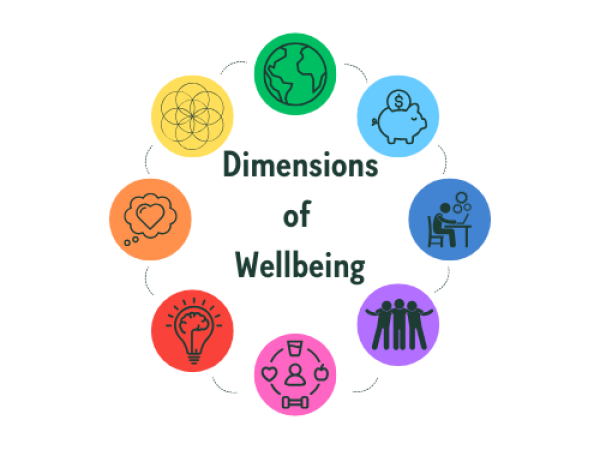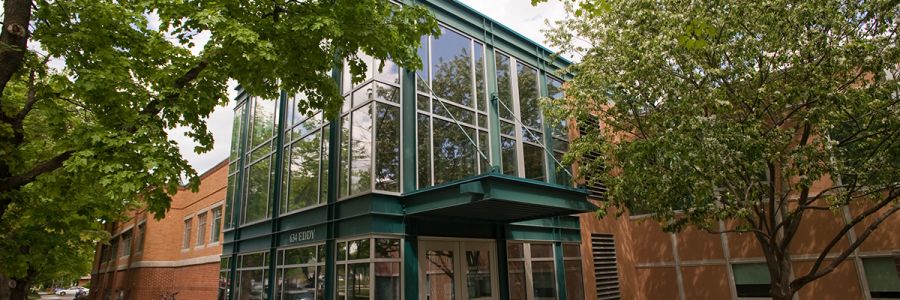
Dimensions of Wellbeing
Wellbeing integrates all dimensions of wellness into its approach, recognizing that each aspect impacts overall health and well-being.
We promote personal responsibility for achieving and maintaining wellness, encouraging everyone to actively incorporate these dimensions into their daily lives.
-
 Maintaining a healthy body through exercise, nutrition, sleep, and regular medical care.
Maintaining a healthy body through exercise, nutrition, sleep, and regular medical care.
This can look like:- Exercise regularly with activities like jogging, swimming, or gym workouts.
- Eat a balanced diet with fruits, vegetables, whole grains, and lean proteins.
- Drink plenty of water throughout the day.
- Aim for 7-9 hours of quality sleep each night.
- Maintain personal hygiene with regular handwashing and grooming.
- Limit or avoid alcohol, nicotine, and recreational drugs.
- Visit healthcare providers for routine check-ups and screenings.
-
 Building supportive, healthy relationships and contributing to the community.
Building supportive, healthy relationships and contributing to the community.This can look like:
- Join student clubs or organizations to meet new people.
- Attend campus events and social gatherings to engage with the community.
- Build relationships with classmates, professors, and campus staff.
- Practice open and honest communication with friends and peers.
- Participate in group study sessions, team sports, or collaborative projects.
- Volunteer for community service to connect with others and give back.
- Balance your social activities with academic responsibilities.
-
 Managing stress, coping with challenges, and expressing emotions in a healthy way.
Managing stress, coping with challenges, and expressing emotions in a healthy way.
This can look like:- Practice self-care by engaging in relaxing activities and hobbies.
- Seek support from friends, family, or campus counselors when needed.
- Manage stress with techniques like deep breathing, mindfulness, or exercise.
- Build positive and supportive relationships with friends and peers.
- Set healthy boundaries to balance your workload and prevent burnout.
- Express your emotions through writing, art, or conversations with trusted people.
- Focus on positive thinking and affirmations to maintain an optimistic outlook.
-
 Finding purpose, values, and meaning in life.
Finding purpose, values, and meaning in life. This can look like:
- Practice meditation regularly to enhance inner peace.
- Spend time in self-reflection to understand your values and purpose.
- Connect with nature through activities like hiking or camping.
- Participate in religious or spiritual community groups or events.
- Keep a journal to express your thoughts and spiritual insights.
- Engage in volunteer work to foster compassion and purpose.
-
 Respecting and protecting our surroundings and living spaces.
Respecting and protecting our surroundings and living spaces.This can look like:
- Recycle paper, plastic, glass, and other materials.
- Turn off lights and unplug electronics when not in use.
- Use public transportation, bike, or walk to reduce your carbon footprint.
- Join campus or community clean-up events.
- Choose environmentally friendly and sustainable products.
- Keep your dorm or apartment clean and organized.
- Spend time in nature by visiting parks or hiking trails.
-
 Engaging in lifelong learning and stimulating mental activities.
Engaging in lifelong learning and stimulating mental activities. This can look like:
- Regularly challenge yourself to think critically.
- Take courses or attend lectures in subjects that interest you.
- Join study groups or campus organizations for intellectual discussions.
- Read books, articles, and journals on various topics.
- Participate in workshops, seminars, and conferences.
- Engage in creative activities like writing, painting, or music.
- Continuously learn new skills, such as a new language or technical expertise.
-
 Finding fulfillment and balance in our professional and academic endeavors.
Finding fulfillment and balance in our professional and academic endeavors. This can look like:
- Taking time to reflect often on where you find joy and meaning in life.
- Keeping an open mind to new ideas, opportunities, and feedback.
- Assess career services offerings.
- Exploring various career and volunteer opportunities for diverse experiences.
- Practicing open communication and effective conflict management skills.
- Setting realistic career goals and then taking steps to achieve them.
- Networking with peers, professors, and industry professionals.
- Pursuing internships to gain practical experience in your field of study.
- Seeking mentorship for guidance, advice, and support in your career journey.
-
 Managing resources to achieve financial stability and reduce stress.
Managing resources to achieve financial stability and reduce stress.This can look like:
- Creating a spending plan (i.e., budget).
- Small changes – make your own coffee or eat out less.
- Utilizing resources to expand your budget like UM Food Pantry or other student discounts.
- Reducing or eliminating debt.
- Start a savings account and add small amounts monthly.
- Understanding student loans.
- Write a list before you go shopping.
- Understanding your credit score.
Wellness Wheel Assessment
-
Taking the Wellness Wheel assessment helps you identify areas where you're thriving and highlights opportunities for growth.
By evaluating each dimension of wellness, you can gain insight into your overall wellbeing and target areas for improvement to enhance your personal health and balance.
